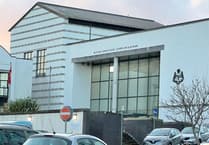The prosecution’s opening argument was yesterday heard on the first day of the trial of a defendant charged with manslaughter after the death of a construction worker.
Stephen Ian Phillips, who worked for Stewart Clague Services Ltd (SCS), was the foreman in charge of the building site at King William’s College in August 2020 when air conditioning engineer Gary Skelding, aged 56, was killed in a scaffolding collapse.
The post-mortem examination revealed that the causes of death were injuries to the head, chest, abdomen and right arm.
Prosecution advocate James Robinson put forward the argument that Mr Phillips was responsible for between 1.56 and 1.6 tonnes of fireboard planks (with each board weighing around 39kg) being placed on the scaffolding tower which was not designed to bear loads.
experience
‘Evidence shows that the scaffolding was not designed as a loading tower, and a foreman with 19 years of experience should have known that,’ Mr Robinson said.
The court heard that Mr Phillips confirmed to Absolute Scaffolding, the supplying company, that the scaffolding was initially erected only to make access to the building easier for the workers.
This, in combination with other factors such as the 36mph winds on the day of the accident, was said to have resulted in the collapse.
However, Mr Robinson argued that the ‘primary action which led to Mr Skelding’s death’ was Mr Phillips’ decision to depart from a plan previously agreed with other workers to hoist the boards to the top of the tower using a telehandler vehicle.
Workers would then have transferred them directly to the roof without the tower ever having to bear their weight.
The advocate outlined to the jury that to be guilty of the manslaughter charge, it would have to be proven that Mr Phillips was guilty of ‘extreme and gross negligence that led to death’, and he argued that the evidence showed this.
Further to this, Mr Robinson said that, with the foreman’s duty of care, he should never have allowed Mr Skelding to volunteer to go out on the tower in an attempt to secure it to the building with straps once it became clear it was unstable. A witness stated that the scaffolding was swaying by inches under the windy conditions.
Mr Robinson also talked about how, despite the fact that it was ‘common knowledge’ in the building trade that scaffolding is not to be altered by anyone other than the company which erected it, Mr Phillips had historically ‘shown a habit of doing this’ and had ‘a cavalier attitude’ to health and safety.
Before Mr Skelding’s death, he said that Mr Phillips had been in the process of removing handrails from the top of the scaffolding in order to allow the fire boards to be loaded on it.
And he said that Mr Phillips had admitted during a police interview that he had not checked the ‘scafftag’, an identifying tag attached to all scaffolding by those who erected it.
The advocate explained that had he done so it would have indicated that the scaffolding was not designed to bear loads, but was instead only to provide workers access.
However, the court heard that in the police interview Mr Phillips said that he thought the scaffolding was meant to take the weight of the fire/plasterboards, and that he thought it was suited for general use, he claimed that they were ‘basically the same’.
Mr Robinson clarified to the jury that SCS had also been charged with health and safety offences, to one of which it had pleaded guilty, and acknowledged that the company had ‘systems deficits’ at the time.
However, he reiterated his argument that it was Mr Phillips’ individual decisions which were the primary contributing factor in Mr Skelding’s death.
The court heard that there was no evidence that SCS had ever requested scaffolding with a load-bearing platform from Absolute Scaffolding.
This company’s senior scaffolder also stated that he asked Mr Phillips if he was sure he wanted access-only (not load-bearing) scaffolding, and that the defendant had replied that he was.
The arguments from the defence will be heard later on in the trial, which is being presided over by Deemster Sandeep Kainth.




